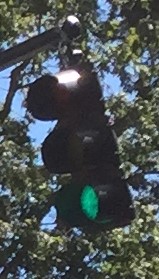When I did a story about broken traffic signals in Raleigh I stumbled across the answer to a question that had bothered me, and here it is:
Why did the percentage of black drivers who were charged with traffic offenses by the N.C. State Highway Patrol increase so dramatically in Raleigh after midnight? I knew that was so because I examined the troopers’ citation database on several occasions when I was an investigative reporter at The New & Observer.
[The trooper database enabled The N&O to answer a question most drivers ask themselves: How fast can you go in North Carolina without getting caught? The answer: nine mph over the limit. About 98, 99 percent speeding tickets written by troopers charged the driver with going 10 miles per hour or more over the limit. “Nine you’re fine, 10 you’re mine,” one trooper told me.]
But what about the disproportionate number of black drivers charged after midnight in Raleigh? Was the patrol profiling, stopping black drivers, looking for evidence of other crimes and, not finding it, writing traffic citations?
I had helped report a Driving While Black story earlier. Joe Neff, another N&O investigative reporter, and I wrote about a State Highway Patrol drug interdiction team operating on Interstates 85 and 95 that had charged black male drivers at nearly twice the rate other troopers had charged black males working the same highways, during the same time periods. In most cases, those black men were charged with minor traffic violations and no drugs were found.
Was something like that happening in Raleigh or was it just because there are a lot more blacks, and a lot fewer whites, up and about in the wee hours of the morning? I didn’t write that story because I didn’t know the answer to that question, and the answer matters a lot.
 The traffic signal story forced me to go to work at 4 a.m., when traffic was light in some areas and pretty much non-existent in others. I drove all over Raleigh, in black and white neighborhoods, filming traffic signals that weren’t operating properly. At that time of the morning, when there is little or no traffic, they really stick out.
The traffic signal story forced me to go to work at 4 a.m., when traffic was light in some areas and pretty much non-existent in others. I drove all over Raleigh, in black and white neighborhoods, filming traffic signals that weren’t operating properly. At that time of the morning, when there is little or no traffic, they really stick out.
I discovered, at 4:15 a.m., I have could have parked my car in the middle of Six Forks Road, the main artery from Raleigh into mostly white North Raleigh, got out, peed, and a lot of times no would have noticed. I didn’t, but I could have.
Sometimes there were no vehicles on Six Forks as far as I could see in either direction. People who lived in North Raleigh and other mostly white sections must have been asleep at that time of the morning.
But in South Raleigh, which was predominately black, a lot of people were out and about. I saw people sitting on their porch, smoking cigarettes. People on sidewalks, headed somewhere. People standing on the corner, listening to music, talking with their friends. And a big majority of drivers I saw before 5 a.m. were black.
I wouldn’t bet my life on it but I think that is the explanation for those weird highway patrol stats.
NOTE: Reporting on broken traffic signals doesn’t sound like much of a story, but it turned out all right. I expanded the story, reporting that a lot of signals on U.S. 70, toward the coast, didn’t work properly either. The N.C. Department of Transportation responded with a multi-million dollar statewide signal improvement program.
Coming Monday: My Father’s Advice: Don’t Do What I Did